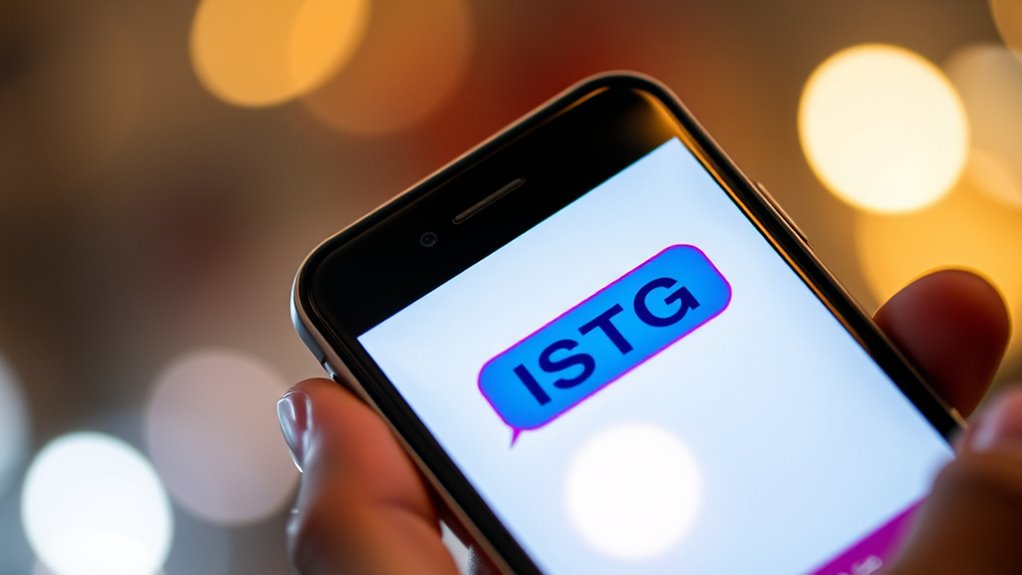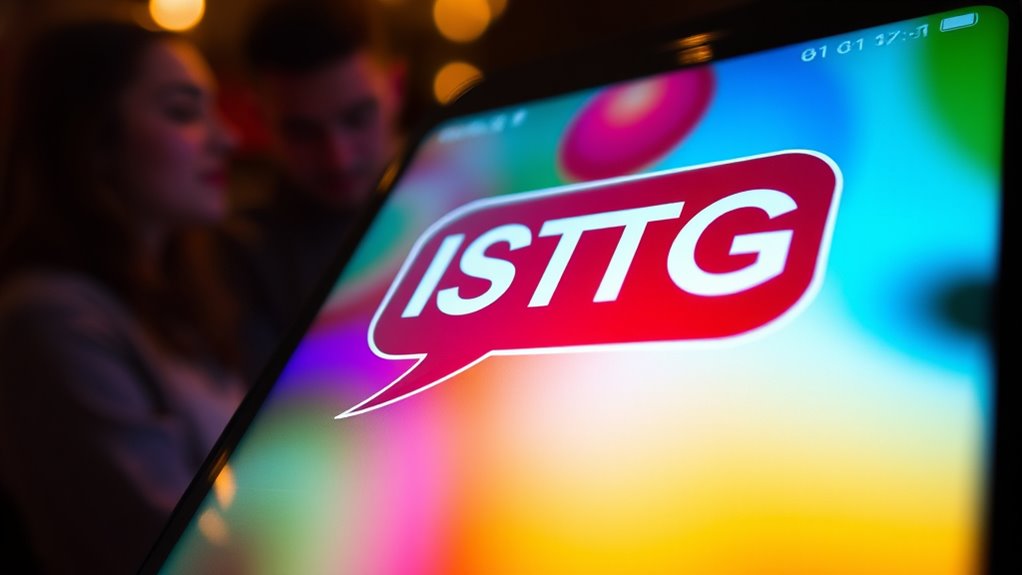ISTG means “I swear to God,” a phrase that started as a serious expression of sincerity or frustration. Online, it’s used as a quick shorthand to emphasize honesty, disbelief, or strong emotion. You’ll see it in social media, texts, or chats, often at the beginning or end of a message. If you want to understand more about its uses and other slang, there’s more to explore behind this abbreviation.
Key Takeaways
- ISTG stands for “I swear to God,” used to express sincerity, frustration, or disbelief in digital communication.
- It evolved into slang, commonly appearing in online chats, social media, and texts for emphasis.
- Typically placed at the beginning or end of a message to highlight emotional tone.
- Used by younger users to convey seriousness or genuine feelings quickly.
- Related abbreviations include “IDK,” “FR,” “IMO,” and “TBH,” reflecting slang evolution.
Origins and Meaning of ISTG

ISTG stands for “I swear to God,” a phrase that has been around for decades but gained popularity online in recent years. Its history origins trace back to traditional expressions of sincerity or frustration, often used in real-life conversations. Over time, this phrase evolved into slang, especially among digital communicators seeking quick, impactful ways to emphasize their feelings. As internet slang evolved, ISTG became a common abbreviation, reflecting how language adapts to online culture. Its use allows you to convey seriousness or disbelief with a simple, concise phrase. The slang evolution of ISTG shows how traditional expressions transform into shorthand that helps keep digital conversations fast-paced and expressive, fitting perfectly into the casual tone of online interaction. Additionally, understanding online slang like ISTG can improve communication clarity in digital environments.
How to Use ISTG in Conversations

When you want to emphasize your sincerity, frustration, or disbelief in a text, incorporating ISTG can make your message more impactful. In the context of slang evolution, ISTG helps convey strong emotions quickly and clearly. In digital communication, where tone can easily be misunderstood, using ISTG clarifies that you’re serious or upset. To use ISTG effectively, place it at the beginning or end of your sentence to highlight your feelings. Keep your message direct and genuine, avoiding overuse to prevent it from losing meaning. Remember, ISTG is a casual expression used mainly among friends or in informal chats. Incorporating it thoughtfully can enhance your online conversations by adding emphasis and emotional depth.
Common Contexts for ISTG

You’ll often see ISTG used in situations where someone wants to express strong emotions like frustration, disbelief, or sincerity. As slang evolves, ISTG has become a common way to emphasize honesty or intensity in online communication. Whether you’re reading a friend’s message about a frustrating situation or someone expressing amazement, ISTG highlights how serious they are. It’s especially popular among younger users who rely on shorthand to keep conversations quick and expressive. In online chats, texts, or social media posts, ISTG helps convey genuine feelings without lengthy explanations. Its use reflects the ongoing slang evolution, making digital conversations more dynamic and emotionally transparent. Additionally, some users may incorporate website performance metrics to gauge how well their messages resonate with others, further enhancing communication clarity. So, whenever you see ISTG, know it’s often a sign of someone emphasizing their true feelings or reactions.
Variations and Similar Acronyms

Numerous variations and similar acronyms have emerged alongside ISTG to express strong emotions or emphasize honesty in digital conversations. These forms reflect the slang evolution and help you convey feelings more precisely. For example, “IDK” (I don’t know) compares to “IDK” for uncertainty, while “FR” (for real) emphasizes sincerity similar to ISTG. Here’s a quick comparison:
| Acronym | Meaning |
|---|---|
| IMO | In my opinion |
| TBH | To be honest |
| IRL | In real life |
| TTYL | Talk to you later |
These acronyms enhance clarity and emotional tone, making your messages more expressive and authentic in digital chats. Additionally, understanding the appropriate use of pimple patches can help you effectively address skin concerns when they arise.
Tips for Understanding Text Abbreviations

Are you often unsure what abbreviations like ISTG or IRL truly mean in texts? To better understand these, stay updated on slang evolution, which keeps abbreviations fresh and relevant. Pay attention to context clues—if someone says, “OMG, I’m so tired,” emojis like 😴 or 🔥 can clarify the tone. Emoji integration helps convey emotions that text alone might miss, making abbreviations easier to interpret. When in doubt, look up unfamiliar acronyms or ask friends for clarification. Engaging with social media, chats, and forums exposes you to new slang and abbreviations in real-time. Staying aware of how slang evolves and noticing emoji use enhances your communication skills by understanding language trends, allowing you to decode abbreviations quickly and confidently.
Frequently Asked Questions
When Did ISTG First Become Popular Online?
You might notice ISTG first gained popularity around 2017, as part of the evolution of internet slang. Its origins of ISTG popularity come from teens and young adults seeking quick, expressive ways to communicate online. As social media platforms like Twitter and TikTok grew, ISTG spread rapidly, making it a common part of digital conversations. Its concise, impactful nature helped it become a staple in modern texting and messaging.
Are There Formal Settings Where ISTG Should Be Avoided?
You should avoid using ISTG in formal settings, like workplace communication or professional emails. It’s considered informal slang that doesn’t align with proper etiquette, which values clarity and professionalism. Using abbreviations like ISTG can undermine your credibility and seem unprofessional. To maintain respect and clarity, stick to complete words and proper language in formal situations. This shows you respect workplace etiquette and communicate effectively.
Can ISTG Be Used in Professional or Academic Texts?
You shouldn’t use ISTG in professional or academic texts because it doesn’t match the appropriate tone expected in formal settings. Rely on clear, complete words rather than abbreviations, especially when context clues may not be enough for everyone to understand slang. Using proper language helps you communicate more effectively and shows respect for your audience, ensuring your message comes across as polished and professional.
What Are Some Common Mistakes When Using ISTG?
You might think slang misuse and abbreviation confusion are minor, but they’re common mistakes with ISTG. You often overuse it in formal texts, forgetting it’s just internet slang for “I swear to God.” Sometimes, you forget that abbreviations like ISTG can lead to misunderstandings, especially if your audience isn’t familiar. Keep in mind, using it correctly means knowing when to avoid it—like in professional or serious conversations.
How Does ISTG Differ From Similar Expressions Like “I Swear”?
In slang context, ISTG differs from “I swear” by adding stronger emotional emphasis, often expressing frustration or seriousness. When you use ISTG, you’re asserting sincerity more intensely, showing you truly mean what you’re saying. Unlike “I swear,” which can sometimes be casual or exaggerated, ISTG conveys a sense of real commitment or frustration, making your message feel more urgent and genuine.
Conclusion
Remember, language is always evolving, and abbreviations like ISTG help keep conversations quick and expressive. As the saying goes, “A picture is worth a thousand words,” but sometimes, a simple acronym can say even more. By understanding what ISTG means and how to use it, you’ll communicate more confidently in texts. So, keep learning and don’t be afraid to embrace new slang—after all, knowledge is power, and every word counts!









